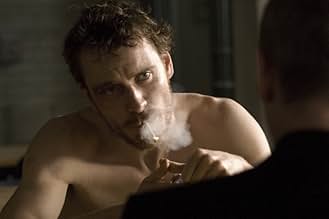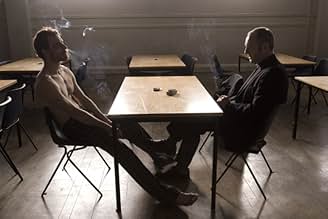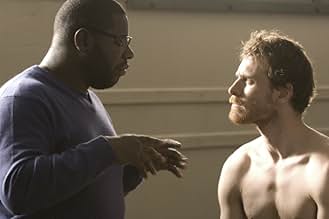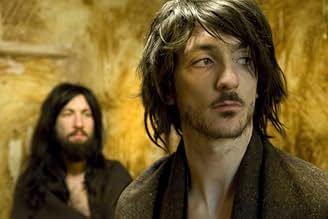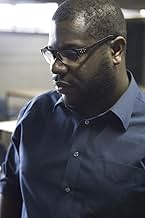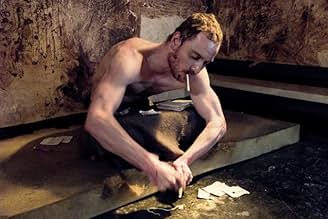IMDb रेटिंग
7.5/10
75 हज़ार
आपकी रेटिंग
आयरिश रिपब्लिकन बॉबी सैंड्स भूख हड़ताल में उत्तरी आयरिश जेल के कैदियों का नेतृत्व करते हैं।आयरिश रिपब्लिकन बॉबी सैंड्स भूख हड़ताल में उत्तरी आयरिश जेल के कैदियों का नेतृत्व करते हैं।आयरिश रिपब्लिकन बॉबी सैंड्स भूख हड़ताल में उत्तरी आयरिश जेल के कैदियों का नेतृत्व करते हैं।
- 1 BAFTA अवार्ड जीते गए
- 49 जीत और कुल 39 नामांकन
फ़ीचर्ड समीक्षाएं
Bobby Sands (Michael Fassbender) did something that was a risk, one that would have made others squirm or back out. He was in prison already for four or more years, as a leader in the IRA in Ireland, when he decided to go on a hunger strike. Not just him, mind you, but others along with him, who would all go hungry and, more than possibly, put their bodies on the line for the sake of their brothers in the war, until Britain did something. But the brilliance of Hunger is that director Steve McQueen (not to be confused with the action star) gives us a very straightforward (shockingly so) view of the conditions at the prison, the cell-block where IRA members were put in cells, inhumanely in fact, with feces commonly strewn on the walls and prisoners regularly beaten by SWAT teams and prison guards in general... then, after a very long scene of talk where Sands hears his own plan in front of a priest, the hunger strike in action. It's unrelenting cinema.
It's also sometimes a bit much to take in. You have to know this is not at all melodramatic, but done with little dialog, sometimes in just a few words or whispers (a female narrator pops up once or twice to put things into a sort of context), and compositions that bring out claustrophobia and the endless time spent in the prison. One might wonder why McQueen chooses to keep a shot going for so long on something as trivial, or just routine, as a guard cleaning up the urine left by all the prisoners in the hallways (all in one shot), but it's about that really: the routine of a horrible process of living, of 'us' and 'them' between the prisoners and the guards in this Northern Ireland prison, with Sands as a sort of unofficial leader inside. The length of shots, and the moments where characters burst out in anger and rage, are deliberate and dramatic and powerful.
If I had any problem with Hunger, it's that it is misleading in its first half hour. We're given two prisoners, not Sands, and a prison guard, and we're shown the horrid conditions of living in a solitary-confined prison (feces on the wall, anyone?). But Bobby Sands, the main character, isn't introduced for quite a while. It's an outstanding scene when he is introduced, kicking and pounding and getting beaten down as his hair and beard are cut, yet by then it's been perhaps too long to get to this point. It's also jarring how McQueen structures his film it terms of silent and sound: there's a fifteen minute stretch (almost all in one two-shot) where there's nothing but dialog between Sands and the priest (albeit a riveting conversation about sacrifice and humanity), but aside from this it's all just watching first the IRA members in the horror of prison conditions, and second Sands in his deterioration of the hunger strike.
And yet it is a powerful experience and a stunning debut. It reminds me a little like The Machinist in observing its lead character fade away, literally, before our eyes, only here the stakes are far greater than a tricky neo-noir plot. Fassbender is also mesmerizing for any given moment he's on screen. And yet as great as the film ultimately may be, or is, I don't have a desire to watch it again. It's about as bleak as a rainy day in Dublin - I mean a real rainy day. You won't feel good when the movie ends, but you'll know you have seen the emergence of a filmmaker with something to say, and an actor who will go to the limits, much like Christian Bale, for the sake of the character's importance in the story. Frankly, it rarely gets more dramatic and life-or-death than Bobby Sands.
It's also sometimes a bit much to take in. You have to know this is not at all melodramatic, but done with little dialog, sometimes in just a few words or whispers (a female narrator pops up once or twice to put things into a sort of context), and compositions that bring out claustrophobia and the endless time spent in the prison. One might wonder why McQueen chooses to keep a shot going for so long on something as trivial, or just routine, as a guard cleaning up the urine left by all the prisoners in the hallways (all in one shot), but it's about that really: the routine of a horrible process of living, of 'us' and 'them' between the prisoners and the guards in this Northern Ireland prison, with Sands as a sort of unofficial leader inside. The length of shots, and the moments where characters burst out in anger and rage, are deliberate and dramatic and powerful.
If I had any problem with Hunger, it's that it is misleading in its first half hour. We're given two prisoners, not Sands, and a prison guard, and we're shown the horrid conditions of living in a solitary-confined prison (feces on the wall, anyone?). But Bobby Sands, the main character, isn't introduced for quite a while. It's an outstanding scene when he is introduced, kicking and pounding and getting beaten down as his hair and beard are cut, yet by then it's been perhaps too long to get to this point. It's also jarring how McQueen structures his film it terms of silent and sound: there's a fifteen minute stretch (almost all in one two-shot) where there's nothing but dialog between Sands and the priest (albeit a riveting conversation about sacrifice and humanity), but aside from this it's all just watching first the IRA members in the horror of prison conditions, and second Sands in his deterioration of the hunger strike.
And yet it is a powerful experience and a stunning debut. It reminds me a little like The Machinist in observing its lead character fade away, literally, before our eyes, only here the stakes are far greater than a tricky neo-noir plot. Fassbender is also mesmerizing for any given moment he's on screen. And yet as great as the film ultimately may be, or is, I don't have a desire to watch it again. It's about as bleak as a rainy day in Dublin - I mean a real rainy day. You won't feel good when the movie ends, but you'll know you have seen the emergence of a filmmaker with something to say, and an actor who will go to the limits, much like Christian Bale, for the sake of the character's importance in the story. Frankly, it rarely gets more dramatic and life-or-death than Bobby Sands.
I saw Hunger at TIFF. I heard it was a hot ticket, and pre-festival buzz was good so I was elated when I got tickets. McQueen uses very little dialogue throughout the film, instead choosing to communicate through strong visuals and raw imagery. The film is less about the politics behind the IRA conflict, and more about the suffering of the prisoners and the dehumanization of them at the hands of the guards. It is not an easy film to watch. The imagery is so strong and raw that I couldn't help but grimace during some parts. The lady sitting next to me had her hands covering her face at one point, and was visibly crying. McQueen holds nothing back. The prisoners are shown smearing excrement over their cell walls and pouring their prison food over the floor until it goes bad and are covered with bugs. McQueen demonstrates the unwillingness of the prisoners to be stripped of their dignity (by conforming to prison demands), despite being stripped of everything else. There are some very long takes with no dialogue, with a particularly long one of a prisoner cleaning himself for what seemed like forever. The atmosphere in these scenes is so visceral that one can almost feel the filth and smell the stench of the prisoners. There is also one particularly brutal scene where the guards make two lines, and each nonconforming prisoner is marched through the middle while being repeatedly beaten by batons. Afterward, one of the officers walks outside and weeps. It is then that we learn to see the guards as human; perhaps even victims trapped within a conflict with no resolution in sight.
The story of Bobby Sands takes precedent about half way into the film. The most dialogue in the films occurs during the scenes between Sands and his priest. Unfortunately the Irish accents are thick, and I found the scene hard to decipher. The final scenes in the film are tough to watch as we witness Sands' slow dissent into the throes of starvation. It is hard to imagine anyone subjecting themselves to such suffering, yet 9 other prisoners followed suit. Fassbender is very good in the role; giving us a character that is unrelenting in his choices and beliefs. He genuinely believes his suffering serves a purpose, and though some may disagree with his choices, one can't help but admire his conviction.
Hunger is an artfully done film, which is no surprise considering McQueen is a visual artist. It is visually moving and challenging piece of work. It is hard to believe that it's his first feature, and easy to understand why it won the Camera d'or, and now the Discovery award at TIFF. I would have preferred a bit more back story to the conflict (I know close to nothing of its history), but then again, choosing to put more focus on politics may have taken away from other elements of the film. Lastly, I appreciate McQueen's unwillingness to take a stand on the conflict/protest in his film. He allows the viewers to make their own judgments; he's merely here to tell the story.
The story of Bobby Sands takes precedent about half way into the film. The most dialogue in the films occurs during the scenes between Sands and his priest. Unfortunately the Irish accents are thick, and I found the scene hard to decipher. The final scenes in the film are tough to watch as we witness Sands' slow dissent into the throes of starvation. It is hard to imagine anyone subjecting themselves to such suffering, yet 9 other prisoners followed suit. Fassbender is very good in the role; giving us a character that is unrelenting in his choices and beliefs. He genuinely believes his suffering serves a purpose, and though some may disagree with his choices, one can't help but admire his conviction.
Hunger is an artfully done film, which is no surprise considering McQueen is a visual artist. It is visually moving and challenging piece of work. It is hard to believe that it's his first feature, and easy to understand why it won the Camera d'or, and now the Discovery award at TIFF. I would have preferred a bit more back story to the conflict (I know close to nothing of its history), but then again, choosing to put more focus on politics may have taken away from other elements of the film. Lastly, I appreciate McQueen's unwillingness to take a stand on the conflict/protest in his film. He allows the viewers to make their own judgments; he's merely here to tell the story.
Steve McQueen, a noted young British artist, has made a powerful first film about the Irish prisoners in H-Block of Maze Prison, Northern Ireland, and the hunger strike and death of Bobby Sands in 1981. The images are searing, both horrible and beautiful (McQueen is aware from Goya that images of war can be both), and much of the film is non-verbal, but the action is broken up by a centerpiece tour-de-force debate between Sands (Michael Fassbender) and Father Dominic Moran (Liam Cunningham) that is as intensely verbal as the rest is wordless. In Irish playwright Enda Walsh's rapid-fire dialogue quips are exchanged, then passionate declarations, in a duel that's like a killer tennis match: watching, we listen, and the camera, hitherto ceaselessly in motion, becomes still. Hunger, with its rich language, intense images, and devastating story, is surely one of the best English-language of the year, and it understandably won the Camera d'Or at Cannes for the best first film. Like the American Julian Schnabel, Steve McQueen is another visual artist who has turned out to be an astonishingly good filmmaker.
Faithful to the physical details of the H-blocks and the treatment of the prisoners, the film is still honed down to essentials and includes a series of sequences so intense it may take viewers a long time to digest them. As the film opens, an officer of the prison, Raymond Lohan (Stuart Graham), follows his normal routine. His knuckles are bloody and painful; later we learn why. His wife brings him sausage, rasher, and eggs.
Davey Gillen (Brian Milligan) a young Irish republican prisoner, tall, gaunt, and Christ-like, is brought into the prison. He refuses to wear the prison uniform, so, joining the Blanket protest, he's put in with fellow "non-conforming" prisoner Gerry Campbell (Liam McMahon) in a cell whose walls are smeared with feces. Those of us who were around when these events happened (Steve McQueen was 12, and remembers the coverage), remember them so well we could have seen these walls. Campbell shows Gillen hot to receive "comms" (communications) from visitors and pass them to their leader Bobby Sands at Sunday mass.
When prisoners agree to wear civilian garments, they're mocked by the "clown clothes" they're handed out and riot, screaming and yelling and tearing up everything in their cells. They also periodically collect their urine and pour it under their cell doors out into the prison hallway where the guards must walk. The result is a brutal punishment by the prison in which the prisoners are taken out to the hallway and beaten naked by a gauntlet of police in riot gear. An eventual repercussion is that Raymond Lohan is shot dead while visiting his catatonic mother in a home.
A poetic flourish of the meeting between Sands and Father Moran is Sands's story of going to the country as a Belfast boy on the cross country team and going down to a woods and a stream where he is the only one who dares to put a dying foal out of its misery by drowning it. The images this tale evoke become the objective correlative of Bobby's last thoughts when he is dying in the prison hospital.
The central issue was being treated as political prisoners. From 1972, paramilitary prisoners had held some of the rights of prisoners of war. This ended in March 1976 and the republican prisoners were sent to the new Maze Prison and its "H-blocks" near Belfast. Special Category Status for prisoners convicted of terrorist crimes was abolished by the English government. Hunger doesn't focus on ideology or public policy, other than to have the voice of Margaret Thatcher, in several orotund declarations, adamantly denying the validity of the republicans' cause or status. The Sands-Moran debate is more about feelings and tactics.
Another powerful contrast comes when Sand goes on the hunger strike and is taken to the clean, quiet setting of the hospital where he is lovingly cared for and visited by a good friend and his parents, who're even allowed to sleep there during his last days. Sands' condition is dramatic, heightened by horrible sores, and a report to his parents of the rapid damage to internal organs and heart that his fast will cause.
It was McQueen's decision to eschew a screenwriter in favor of a playwright for the script, and his choice of his near-contemporary Enda Walsh, an Irishman resident in London, was a wise one. McQueen determined the structure and inspired the paring down. Walsh makes the central verbal scene sing. Its intensity is such that it has no trouble at all competing with the harsh prison scenes. It is brilliant stroke. Great theater you could say, but the film's contribution is to make the whole train of events alive and human at a time when they are acutely relevant to the post 9/11 world of Guantanamo and Abu Ghraib.
Shown at Cannes, Telluride, and Toronto, included in the New York Film Festival 2008.
Faithful to the physical details of the H-blocks and the treatment of the prisoners, the film is still honed down to essentials and includes a series of sequences so intense it may take viewers a long time to digest them. As the film opens, an officer of the prison, Raymond Lohan (Stuart Graham), follows his normal routine. His knuckles are bloody and painful; later we learn why. His wife brings him sausage, rasher, and eggs.
Davey Gillen (Brian Milligan) a young Irish republican prisoner, tall, gaunt, and Christ-like, is brought into the prison. He refuses to wear the prison uniform, so, joining the Blanket protest, he's put in with fellow "non-conforming" prisoner Gerry Campbell (Liam McMahon) in a cell whose walls are smeared with feces. Those of us who were around when these events happened (Steve McQueen was 12, and remembers the coverage), remember them so well we could have seen these walls. Campbell shows Gillen hot to receive "comms" (communications) from visitors and pass them to their leader Bobby Sands at Sunday mass.
When prisoners agree to wear civilian garments, they're mocked by the "clown clothes" they're handed out and riot, screaming and yelling and tearing up everything in their cells. They also periodically collect their urine and pour it under their cell doors out into the prison hallway where the guards must walk. The result is a brutal punishment by the prison in which the prisoners are taken out to the hallway and beaten naked by a gauntlet of police in riot gear. An eventual repercussion is that Raymond Lohan is shot dead while visiting his catatonic mother in a home.
A poetic flourish of the meeting between Sands and Father Moran is Sands's story of going to the country as a Belfast boy on the cross country team and going down to a woods and a stream where he is the only one who dares to put a dying foal out of its misery by drowning it. The images this tale evoke become the objective correlative of Bobby's last thoughts when he is dying in the prison hospital.
The central issue was being treated as political prisoners. From 1972, paramilitary prisoners had held some of the rights of prisoners of war. This ended in March 1976 and the republican prisoners were sent to the new Maze Prison and its "H-blocks" near Belfast. Special Category Status for prisoners convicted of terrorist crimes was abolished by the English government. Hunger doesn't focus on ideology or public policy, other than to have the voice of Margaret Thatcher, in several orotund declarations, adamantly denying the validity of the republicans' cause or status. The Sands-Moran debate is more about feelings and tactics.
Another powerful contrast comes when Sand goes on the hunger strike and is taken to the clean, quiet setting of the hospital where he is lovingly cared for and visited by a good friend and his parents, who're even allowed to sleep there during his last days. Sands' condition is dramatic, heightened by horrible sores, and a report to his parents of the rapid damage to internal organs and heart that his fast will cause.
It was McQueen's decision to eschew a screenwriter in favor of a playwright for the script, and his choice of his near-contemporary Enda Walsh, an Irishman resident in London, was a wise one. McQueen determined the structure and inspired the paring down. Walsh makes the central verbal scene sing. Its intensity is such that it has no trouble at all competing with the harsh prison scenes. It is brilliant stroke. Great theater you could say, but the film's contribution is to make the whole train of events alive and human at a time when they are acutely relevant to the post 9/11 world of Guantanamo and Abu Ghraib.
Shown at Cannes, Telluride, and Toronto, included in the New York Film Festival 2008.
It's 1981. Raymond Lohan (Stuart Graham) is a guard in the Maze Prison, Northern Ireland. Davey Gillen is a new IRA prisoner who refuses to wear prison uniforms. He's put in with Gerry who has smeared the cell with his own feces. They smuggle things in and out of the prison. Bobby Sands (Michael Fassbender) leads the prisoners in a hunger strike.
It's quiet film and full of little details. It doesn't wallow in the brutality but lets it envelop the movie. There is a realism in the movie that is more powerful than any flash or action sequence. One really gets the sense of dehumanization. Dialog is sparse but there is a great discussion between Sands and Father Dominic Moran. This is quietly brutal and some great performances including Fassbender.
It's quiet film and full of little details. It doesn't wallow in the brutality but lets it envelop the movie. There is a realism in the movie that is more powerful than any flash or action sequence. One really gets the sense of dehumanization. Dialog is sparse but there is a great discussion between Sands and Father Dominic Moran. This is quietly brutal and some great performances including Fassbender.
Hunger (2008) ****
Bobby Sand's story has been told before on screen, but never with such raw intensity and unrelenting artistry as in Hunger. The film is directed by Turner Prize winning artist Steve McQueen. While his art has often been part of the film medium, this is his first entry into feature film-making.
The film sparked both controversy and applause at this years Cannes Film Festival, with both disgusted walkouts and rousing ovation. It the end it landed McQueen the Camera D'or.
While the film follows the final weeks of Bobby Sand's hunger strike, it is equally about recreating the atmosphere and conditions inside the infamous Long Kesh Maze Prison. Its nearly a half hour into the film before we even meet Sands, in fact. We're introduced to a prison guard, who outside nervously checks his car for bombs, quietly avoids his comrades, then becomes as vicious as any other when brutalizing the inmates. We're also first introduced to a new inmate, who, as per the IRA standard, refuses to war a uniform and instead goes simply wrapped in a blanket. He and his cellmate smear the walls of their cells in feces as part of the no wash protest.
Bobby is played by Michael Fassbender, who gives a quietly powerful performance. For the film he underwent a medically supervised crash diet, one rivaling - if not outright surpassing - that of Christian Bale in the Machinist. He moves throughout the film with a sense of determination and dedication.
It is difficult to go into any detail about plot, as the film more or less moves patiently and quietly towards the inevitable. And the key word may be quiet. McQueen claimed that he originally envisioned doing the film dialogue free. Indeed, much of Hunger is free of dialogue. However, McQueen, as he puts it, felt it would be more powerful to go from vocal silence into an avalanche of dialogue. And so the films centerpiece was born - a 20 minute stationary shot of Bobby speaking with his Priest. In a film that is filled with a dark heaviness in a cruel prison atmosphere, that meeting lifts a weight for a time, before slowly descending into a sad sense of inevitability. Though that inevitability is liberating, it is nonetheless a profoundly sad one. The film also does not shy away from the cruelty of the British towards the Irish, though it also does not deny the brutality of the IRA at times - as characterized in one shocking moment. However, anyone with any inkling of rational knowledge on the Irish struggles knows that the IRA was never simply a terrorist organization, but a rebel group that did from time to time employ terrorist tactics. Like all anti-state organizations, however, the IRA did not exist for the sake of conflict, but because of callousness and cruelty. McQueen reminds us of the cruelty and arrogance of the British particularly through the cold words of Margaret Thatcher, speaking shamelessly about Sands' strike.
There have been many fantastic films about the Irish Struggles, with some of the best coming in recent years (Ken Loach's fantastic Wind that Shakes the Barley, and Paul Greengrass's Bloody Sunday, to name two of the better). This one, I think, may be the best. At least from an artistic and purely visceral standpoint. McQueen captures his scenes in jarring compositions, with all the skill and artistic imagining of a true artist. From the opening sequences, Hunger promises something more than just the standard. Whereas most political films focus all their attention on the message, Hunger focuses on the feeling, and never strays from its artistic goals. This is art, from its opening to closing frames. It's a boldly crafted and brave film. The cinematography and direction are assured, moving slowly and unexpectedly, always beautifully even in its darkest and dirtiest moments.
I believe this truly is a great masterpiece. McQueen has proved himself as a masterful artist of film-making as well with Hunger.
Bobby Sand's story has been told before on screen, but never with such raw intensity and unrelenting artistry as in Hunger. The film is directed by Turner Prize winning artist Steve McQueen. While his art has often been part of the film medium, this is his first entry into feature film-making.
The film sparked both controversy and applause at this years Cannes Film Festival, with both disgusted walkouts and rousing ovation. It the end it landed McQueen the Camera D'or.
While the film follows the final weeks of Bobby Sand's hunger strike, it is equally about recreating the atmosphere and conditions inside the infamous Long Kesh Maze Prison. Its nearly a half hour into the film before we even meet Sands, in fact. We're introduced to a prison guard, who outside nervously checks his car for bombs, quietly avoids his comrades, then becomes as vicious as any other when brutalizing the inmates. We're also first introduced to a new inmate, who, as per the IRA standard, refuses to war a uniform and instead goes simply wrapped in a blanket. He and his cellmate smear the walls of their cells in feces as part of the no wash protest.
Bobby is played by Michael Fassbender, who gives a quietly powerful performance. For the film he underwent a medically supervised crash diet, one rivaling - if not outright surpassing - that of Christian Bale in the Machinist. He moves throughout the film with a sense of determination and dedication.
It is difficult to go into any detail about plot, as the film more or less moves patiently and quietly towards the inevitable. And the key word may be quiet. McQueen claimed that he originally envisioned doing the film dialogue free. Indeed, much of Hunger is free of dialogue. However, McQueen, as he puts it, felt it would be more powerful to go from vocal silence into an avalanche of dialogue. And so the films centerpiece was born - a 20 minute stationary shot of Bobby speaking with his Priest. In a film that is filled with a dark heaviness in a cruel prison atmosphere, that meeting lifts a weight for a time, before slowly descending into a sad sense of inevitability. Though that inevitability is liberating, it is nonetheless a profoundly sad one. The film also does not shy away from the cruelty of the British towards the Irish, though it also does not deny the brutality of the IRA at times - as characterized in one shocking moment. However, anyone with any inkling of rational knowledge on the Irish struggles knows that the IRA was never simply a terrorist organization, but a rebel group that did from time to time employ terrorist tactics. Like all anti-state organizations, however, the IRA did not exist for the sake of conflict, but because of callousness and cruelty. McQueen reminds us of the cruelty and arrogance of the British particularly through the cold words of Margaret Thatcher, speaking shamelessly about Sands' strike.
There have been many fantastic films about the Irish Struggles, with some of the best coming in recent years (Ken Loach's fantastic Wind that Shakes the Barley, and Paul Greengrass's Bloody Sunday, to name two of the better). This one, I think, may be the best. At least from an artistic and purely visceral standpoint. McQueen captures his scenes in jarring compositions, with all the skill and artistic imagining of a true artist. From the opening sequences, Hunger promises something more than just the standard. Whereas most political films focus all their attention on the message, Hunger focuses on the feeling, and never strays from its artistic goals. This is art, from its opening to closing frames. It's a boldly crafted and brave film. The cinematography and direction are assured, moving slowly and unexpectedly, always beautifully even in its darkest and dirtiest moments.
I believe this truly is a great masterpiece. McQueen has proved himself as a masterful artist of film-making as well with Hunger.
क्या आपको पता है
- ट्रिवियाHunger is known for its unbroken 17 minute 10 second continuous shot, in which Catholic priest Father Dominic Moran tries to talk Bobby Sands out of the Hunger Strike he and his fellow 75 IRA members plan to start. The camera remains in the same position throughout the scene. To prepare, Liam Cunningham moved into Michael Fassbender's apartment, and they rehearsed the scene 12-15 times per day. On the first day of filming, the actors got it perfect after 4 takes.
- गूफ़Thatcher's speech that says "the men of violence have chosen in recent months to play what may well be their last card" is shown in the film when the hunger strike is beginning, but it was actually made after Bobby Sands had died. It was made on 28th May 1981. Bobby Sands died on 5th May 1981.
- भाव
Bobby Sands: I have my belief, and in all its simplicity that is the most powerful thing.
- कनेक्शनFeatured in Front Row: Michael Fassbender/Kate Winslet (2017)
- साउंडट्रैकIndustry
Performed by Maya Beiser
Composed by Michael Gordon
Published by Red Poppy in association with G. Schirmir, Inc.
टॉप पसंद
रेटिंग देने के लिए साइन-इन करें और वैयक्तिकृत सुझावों के लिए वॉचलिस्ट करें
- How long is Hunger?Alexa द्वारा संचालित
- Is "Hunger" based on a book?
- Why did Bobby Sands starve himself?
- Who 'won' the confrontation?
विवरण
- रिलीज़ की तारीख़
- कंट्री ऑफ़ ओरिजिन
- आधिकारिक साइट
- भाषाएं
- इस रूप में भी जाना जाता है
- Tù Khổ Sai
- फ़िल्माने की जगहें
- उत्पादन कंपनियां
- IMDbPro पर और कंपनी क्रेडिट देखें
बॉक्स ऑफ़िस
- बजट
- £15,00,000(अनुमानित)
- US और कनाडा में सकल
- $1,54,084
- US और कनाडा में पहले सप्ताह में कुल कमाई
- $1,980
- 7 दिस॰ 2008
- दुनिया भर में सकल
- $31,85,113
- चलने की अवधि1 घंटा 36 मिनट
- रंग
- ध्वनि मिश्रण
- पक्ष अनुपात
- 2.35 : 1
इस पेज में योगदान दें
किसी बदलाव का सुझाव दें या अनुपलब्ध कॉन्टेंट जोड़ें





